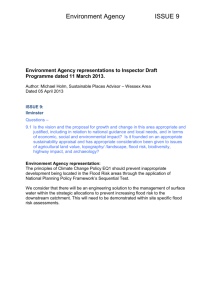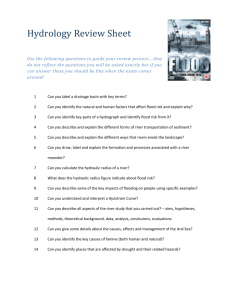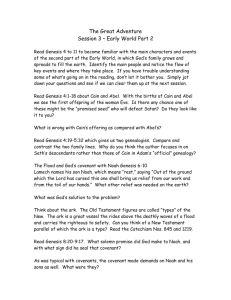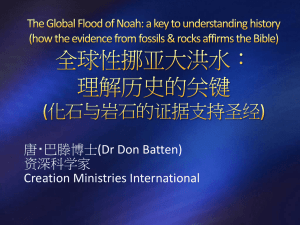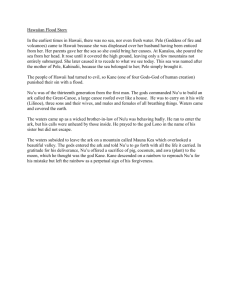Myths of Destruction
advertisement
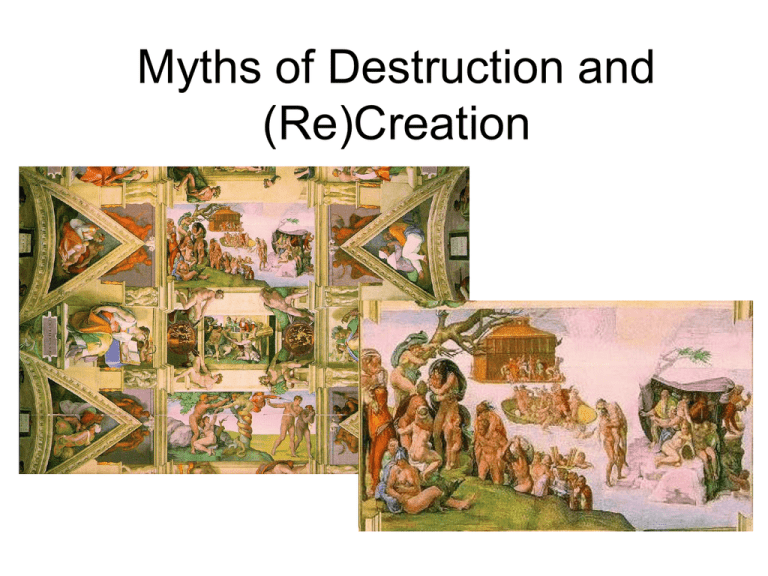
Myths of Destruction and (Re)Creation Cosmic Cycle • • • • Creation and Recreation Not Armaggedon (the end of the world) But a refinement of creation Ages of Humankind Themes • Destruction by Flood – Bible – Ovid’s Metamorphoses – Gilgamesh • Destruction by Fire – Prose Edda • Rebirth Ea/Enki in Epic of Gilgamesh Clylinder seal impression showing the Mesopotamian "god of Wisdom," called Ea (Aya, Ayya or Enki) with two streams of water pouring forth from his shoulders. Ea warned the Mesopotamian Noah, Utnapishtim of Shuruppak of the coming Flood advising him to build himself an ark for his family and animals. On the 7th day of the Flood, the SEBITTU DAY, Ea rested with ALL the other gods, the Flood having destroyed mankind whose noise and clamor had earlier prevented the gods from resting by day or sleeping by night. Ages of Man • Hesiod. Works and Days (lines 156-201) – – – – – Gold Silver Bronze Heroic Iron Age of Cronus Age of Zeus • Ovid, Metamorphoses Book I – – – – Gold Silver Bronze Iron Lucas Cranach. Golden Age. 1530 Lucas Cranach. Silver Age. 1530 Iron Age. Engraving by Virgil Solis for Ovid's Metamorphoses Book I, 141-150. Fol. 3v, image 5. Mesoamerican The Aztec tradition of Five Suns also involves four previous ages. Present world preceded by other cycles of creation and destruction. Mesoamerican Jaguar Sun (Nahui Ocelotl) Wind Sun (Nahui Ehecatl) Rain Sun (Nahui Quiahuitl) Water Sun (Nahui Atl) Earthquake Sun Hindu-Vedic Yuga The Hindu and Vedic writings (Manusmṛti or Manusmriti ) make reference to four age or Yuga: Satya (Golden) Treta (Silver) Dwapara (Bronze) and Kali (Iron) 1,728,000 years 1,296,000 years 864,000 years 432,000 years Maha Yuga 4,032,000 years 1000 Maha Yugas = one day of Braham or 4.32 billion years. Greco-Roman Flood No Flood in Hesiod Only in Ovid’s Metamorphoses Key Elements Human Sin/Offence Against the Gods Divine Anger/Retribution Ark “Adam and Eve” (Deucalion and Pyrrha) Oracles Metamorphoses Human Offences in Ovid: Lycaeon Lycaon Lycaeon tries to trick Juppiter into eating human flesh) Compare TANTALUS! Juppiter destroys Lycaeon’s Palace Lycaeon’s Punishment: Lycanthropy Hendrik Goltzius (1558-1617) Divine Assembly Johann Wilhelm Baur, Edition 1703) Ovid, Met. I, 167 Political Dimensions Compare the Assembly of the Gods to the Roman Senate The Greek Flood: Deucalion, and Pyrrha Pyrrha and Deucalion, painted basin, Oraza Fontana or his workshop, 1565-71 Los Angeles, J. Paul Getty Museum. Nicola Giolfino (Italian, 1476–1555) The Myth of Deucalion and Pyrrha, ca. 1550 Tempera on panel 40 ½ x 57 ¾ in. (102.9 x 146.7 cm); frame: 50 ½ x 67 ¼ in. (128.3 x 170.8 cm) Samuel H. Kress Study Collection, 62.159 Religious Dimensions: Piety Deucalion and Pyrrha ask Themis for help. (Johann Postumus, 1542) Ovid, Met. I, 375-380 Human Implications? Tower of Babel Pieter Bruegel: The Tower of Babel 1563 Tower of Babel (Genesis 11:1-9) Futile Human Attempt to become gods hybris cp. Tantalus Aetiology of LANGUAGE Biblical Flood Key terms: aetiological function of myth covenant Elohist writer Genesis immanent god Israelites Leviathan Mesopotamia Nephilim Noah Priestly writer rainbow Tiamat transcendent god Yahwist or Jehovist writer Biblical Flood • Key Elements – Human Sin/Offence Against the Gods – Divine Anger/Retribution – Ark – Covenant (rainbow) – Dietary Restrictions (eating meat) Noah and the Flood COVENANT Influence of Babylonian Flood Story Recreation From the Nuremburg Chronicle at Beloit College, by Hartmann Schedel (1440-1514), Two by Two NOAH'S ARK by Edward Hicks (1780-1849 ) The Dove and the Rainbow COVENANT Noah in the Koran نوحNūḥ (the Arabic form of Noah) is a prophet in the Qur'an. Because the Qur'an is more poem than prose, references to Noah are scattered throughout the Qur'an, but no historical account of the entire Deluge is given. Generally speaking, the references in the Qur'an are consistent with Genesis and Islamic tradition generally accepts the Genesis account as historical. However, the degree of detail varies between the two accounts. Generally, the Qur'anic account emphasizes Noah's preaching of the monotheism of God, and the ridicule heaped on him by idolators. The Koran (Surah Hud: 37) (Surat al-Mumenoon: 23-26) We sent Nuh to his people: He said, “O my people! worship Allah! Ye have no other god but Him. Will ye not fear (Him)?” The chiefs of the Unbelievers among his people said: “He is no more than a man like yourselves: his wish is to assert his superiority over you: if Allah had wished (to send messengers), He could have sent down angels; never did we hear such a thing (as he says), among our ancestors of old.” (And some said): “He is only a man possessed: wait (and have patience) with him for a time.” (Nuh) said: “O my Lord! help me: for that they accuse me of falsehood!” God later instructed Nuh to build the ark: But construct an Ark under Our eyes and Our inspiration, and address Me no (further) on behalf of those who are in sin: for they are about to be overwhelmed (in the Flood). Noah’s Other Son The Qur'anic account contains a detail not included in the Biblical account: a reference to another son who chose not to enter the ark: So the Ark floated with them on the waves (towering) like mountains, and Nuh called out to his son, who had separated himself (from the rest): “O my son! embark with us, and be not with the unbelievers!” The son replied: “I will betake myself to some mountain: it will save me from the water.” Nuh said: “This day nothing can save, from the command of Allah, any but those on whom He hath mercy!” And the waves came between them, and the son was among those overwhelmed in the Flood. (Surah Hud: 42-43) More on the Islamic Noah Also, the Qur'anic account lacks several details of the Genesis account, including the crime of disrespect by Noah's son Ham in mocking, rather than covering his father's nakedness (Genesis 9:22), and the resultant cursing of his grandson Canaan. Some Muslims assert that the flood during Noah's time was a local event, in contrast to the Biblical account which asserts that it was global. They infer this from several Qur'anic verses. Other Muslims, however, hold that the flood was indeed global. The Qur'an is not explicit on the point, allowing for some variety of interpretation. Ragnarok Key terms: Aesir Asgard Baldr Bifrost Einherjar epithet Ganglieri Garm Gylfi Fenrir Frigg Heimdall Hel High One Hoddmimir's Wood Hyrm Lif and Lifthrasir Loki Midgard Serpent Mimir's Spring Mjollnir Naglfar Odin Surt Thor Tyr Ragnarok Vigrid Yggdrasil Add: Muspell Odin Fighting the Wolf Fenrir Ragnorok “Doom of the Gods” Signs and Portents Assembly of the Enemies of the Good The Gods Prepare The Battle between Good and Evil After the Battle—A Different Life The Survivors The New World and a New Order Sons of Muspell Odin and Fenrir Comparative Mythology Compare Germanic Biblical, Greco-Roman, and Babylonian Destruction Myths Cause Taking Action Exceptions Warning Survivors Provisions The Disaster (Flood/Fire) Gods’ Fear of Total Destruction Gods’ Regret Safety Thanksgiving Rewards

